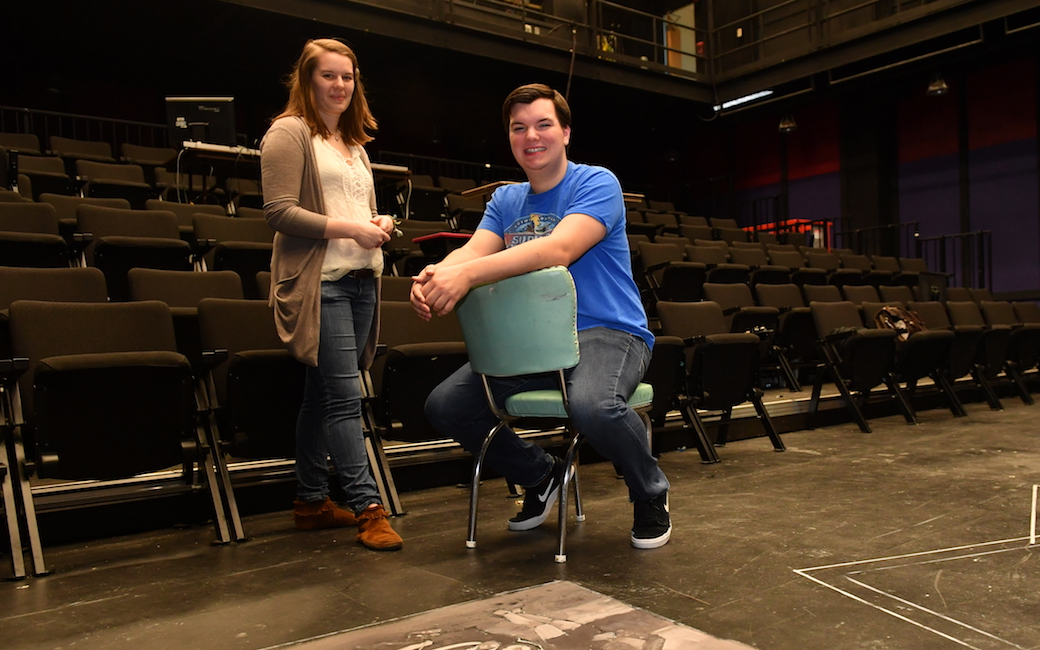The most-important invisible people in the theater
Meet two behind-the-scenes stars who breathe life into the director's vision
By Sedonia Martin on March 8, 2018

The actors may be front and center on stage, but behind-the-scenes, stage managers and assistant directors run the show. They are the behind-the-scenes stars the audience never sees.
Just ask Doris Marusich ’18 and Austin Wilson ’18, stage manager and assistant director respectively, for the College of Fine Arts & Communication Department of Theatre Arts' production of How I Learned to Drive by Paula Vogel. The show will be presented March 8–15 in the TU Center for the Arts Studio Theatre.

How I Learned to Drive is a comedy/drama memory play that tells a surprising and devastating tale of survival, seen through lens of a troubling relationship between a young girl and an older man. The play uses humor and sensitivity to take the audience through a journey of a woman who learns the rules of the road and of life from behind the wheel, all the while dealing with victimization, sexual abuse, alcoholism and, ultimately, healing and forgiveness.
Long before the audience enters the theatre, the stage manager and assistant director are responsible for keeping things running smoothly throughout the production process. From seeing that the actors show up on time, to making sure props and costumes are in place, to feeding lines to actors and so much more, stage managers and assistant directors put out fires and subtly crack the whip from the wings.
“I stage manage because of the benefits that come with job,” says Marusich, who is from Mt. Airy, Maryland. “Getting to work with a variety of different artists and collaborating to create a new work of theatre. Each rehearsal I watch a new piece of work come together and breathe life into the director’s vision.”
The ultimate purpose of a stage manager is to keep chaos at bay, and that responsibility takes a person who loves to be organized which is one of the most challenging parts of the job.
According to Marusich, it’s all about “time management—not just for myself but for the actors, designers, directors, house manager and the other technicians. Making sure everyone’s time is being used wisely and that we’re staying on target, while also planning weeks in advance, can be pretty difficult.”
“This is my first time stage managing a department show for Towson University, and it’s been a whirlwind,” continued Marusich. “I’ve learned that communication is key when you stage manage at a new place. You need to ask those questions that you feel silly for not knowing the answer to, and you need to be willing to accept help from your professors, other artists and my assistant stage managers.”
Depending on the production, the assistant director may be involved from the start, helping with auditions, attending all rehearsals, taking notes and overseeing the deck crew during tech week and performances. The assistant director carries out an active and physical role.
“I wanted to assistant direct for this show because I wanted the opportunity to grow as a director,” said Wilson, who is from Parkville, Maryland. “I felt that learning from [faculty director] Donna Fox would really help me achieve this growth.”
According to Wilson, “The best part of my job is getting to work with such talented people. Seeing them every day and being able to grow closer to them though out the process is something I will always cherish.
“I have become much more confident in my directing impulses and have gained more leadership experience that I can apply to my everyday life.”
Marusich and Wilson thrive in the hectic scheduling and long rehearsals that accompany a theatrical production.
“The best part of my job,” said Marusich, “is watching the show each night and feeling it develop. There comes a point in stage managing that you feel connected to this living thing. And, this thing was a show, but now it’s alive and I’m in charge and taking care of it.”
For Marusich and Wilson, it's an incredibly rewarding feeling, even if no one ever sees them doing it.